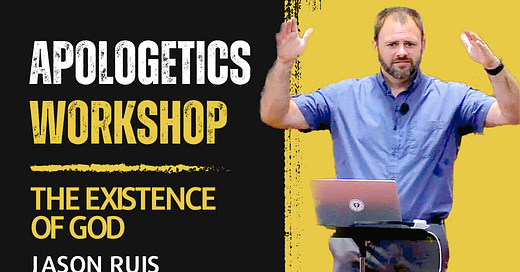
Severed From Christ (Galatians 5:2-12)
[Read Galatians 5:2-12]
There’s a conversation that happens occasionally in our home. A child will look at us in frustration/irritation and say something like, “Why are you always talking about the dishes? We get it. Dirty dishes need to get put in the dishwasher. You tell us that ALL THE TIME!” To which we respond by saying, “Yes, we tell you that all the time because you are not putting your dishes in the dishwasher. Yes, you understand that needs to be done, but you are still not doing it. So, we will keep talking about it until you start doing it. If you want us to stop talking about it, start putting your dishes in the dishwasher.” I’m assuming this conversation is not unusual to many of you.
In going through the book of Galatian, some of you may be thinking the same thing: “Ok Paul, why are you always talking about the fact that we are saved by grace through faith and not by any work of our own? We get it. We know that. You don’t have to keep talking about it all the time.” To which Paul would probably respond: “Yes, you probably do understand it to some degree, but your natural tendency is to try to add to your salvation—to work yourself to heaven. So, I will keep talking about it until I see people living completely by faith and no longer being tempted to earn their salvation.” Or, as Peter says in his second letter, “So I will always remind you of these things, even though you know them and are firmly established in the truth you now have. I think it is right to refresh your memory as long as I live in the tent of this body…” (2 Peter 1:12–13, NIV).
The reality is that we need to be reminded of things over and over and over again. There are certain sins and tendencies within us that do not die easily. You may have been following Christ for fifty or sixty years, but I can guarantee that you still struggle with the temptation to earn your salvation or to add to your salvation. It is so ingrained in our fallen nature, that it does not die easily. It needs to be attacked over and over and over again, so that we can finally/fully have the peace that Christ has earned for us—or as I mentioned in my last sermon, the FREEDOM Christ has earned for us.
You see, the freedom that we have in Christ is under attack and can be lost. That’s what Paul is talking about in this passage. Satan is a taskmaster, a slave-owner, who does not want people to experience the freedom of Christ. He wants people to remain in his power and under his control. So, when they begin to experience freedom in Christ, he attacks. These attacks come in various forms. Two are discussed in this passage.
One of the ways he attacks is through persecution. Paul says, “Brothers, if I am still preaching circumcision, why am I still being persecuted? In that case the offense of the cross has been abolished.” (Galatians 5:11, NIV). Through persecution, Satan tries to silence those who speak the truth about freedom in Christ. He scares people into silence. He threatens them with death, loss of job, disassociation with family/friends, etc. Anything that will keep them from speaking about the truth.
However, persecution isn’t just about complete silencing of the truth. Satan isn’t quite so naive. In battle, full-on frontal attacks are hardly ever successful. What can also happen in persecution is that the message isn’t silenced, but changed slightly to it’s not quite so offensive? The truth isn’t silenced, but twisted. This is what Paul is talking about. He says that he hasn’t changed the message in order to avoid persecution. He hasn’t removed the offensive aspect of the message in order to “win the approval” of the world. It would be easy for him to change his message, remove its offensive nature, and avoid persecution. However, then he would no longer be truly preaching Christ and the message he preached would be of no use to anyone.
This is what Paul is saying the false teachers are doing. This is another way that Satan uses to attack people’s freedom in Christ. He sends false teachers into the church with a twisted gospel message that leads them back into slavery. He sends false teachers into churches to hinder people from following Christ in freedom—leading them back into slavery. These are wolves in sheep’s clothing. Paul says they are bad leaven: “A little yeast works through the whole batch of dough.” (Galatians 5:9, NIV). They sneak into churches and twist things a little bit, just enough so that people don’t think it's a “big deal,” but then it spreads throughout the church until everything is corrupted. Calvin says, “Satan’s stratagem is, that he does not attempt an avowed destruction of the whole gospel, but he taints its purity by introducing false and corrupt opinions” (154).
This is why it’s important for God’s people to know and understand God’s Word. If we do not know God’s Word, we will have no tools to fight for our freedom and will easily be led away into slavery. If we do not know God’s Word, how will we know when a false teacher has snuck into our fellowship? How will we know when someone is twisting the truth? How will we hold teachers accountable? How will we fight for our freedom? This is why it is absolutely necessary for us to be regularly spending time in God’s Word—daily.
This is also why doctrine is important—truth is important. There are many people today who like to say, “Doctrine divides,” and then encourage people to ignore doctrine and simply “Love people.” However, what is love? How do you know if you are rightly loving someone? What if you think you are loving someone and you are actually hating them? You find these things out through doctrine. You find these things out through rightly understanding God’s Word. As R.C. Sproul was fond of saying, “Everyone is a theologian. Some are good theologians. Some are bad theologians. But everyone is a theologian.”
While I’m on this topic, I also want to say something about the way you listen to me preach. One of my favorite passages in scripture comes from the book of Acts. It says, “Now the Bereans were of more noble character than the Thessalonians, for they received the message with great eagerness and examined the Scriptures every day to see if what Paul said was true.” (Acts 17:11, NIV). Now, if it was important for them to examine the scriptures to make sure Paul was correct, how much more should you be examining the scriptures to make sure I am correct? It’s important for this congregation to go home after each sermon, open their Bibles, and make sure that what I said was true.
It’s also important for you to do that whenever you listen to someone speak—whether on TV or in a classroom. You should go back to the Bible, open it up, and make sure what they are saying is true. If you are listening to a television preacher, have your Bible open and be constantly asking yourself, “Is this what scripture actually says?” If you are sitting in a seminar for work, you should be constantly asking yourself, “Is this in line with Scriptures teaching?” If you are listening to a politician speak, you need to be asking, “Is this policy, worldview, etc., in line with scripture?” Every single truth needs to be constantly measured against scripture. When we become lax in doing this, bad leaven gets into the church and “A little yeast works through the whole batch of dough.” (Galatians 5:9, NIV).
It’s also important for us to understand that God is still in control and will deal with false teachers accordingly. Paul says, “The one who is throwing you into confusion will pay the penalty, whoever he may be.” (Galatians 5:10, NIV). False teachers will be punished for leading God’s people astray—leading them back into slavery. God does not sit idly by watching them attack his sheep. They will get what they deserve. We can take comfort in that.
It’s also important to remember that it’s the pastor’s and elders’ job to protect the sheep from false teachers. This is why we see Paul getting so wound up in this letter. He sees his flock being attacked by wolves—people who have snuck into his church, spread false teachings, and are leading people away from Christ to hell. So, he’s pretty wound up. He actually catches us off guard by what he says. He basically says, “These teachers keep talking about how serious they are about the faith. They keep telling you that a real, serious Christian is one that is circumcised. I wish they would show you that they are really hardcore by cutting the whole thing off!” That’s actually what he said! “As for those agitators, I wish they would go the whole way and emasculate themselves!” (Galatians 5:12, NIV).
Yet, this is a much more serious comment than simply Paul protecting his flock and speaking with some “fire in his bones.” It’s definitely that, but it’s more. Paul thinks the symbolic act should actually represent the thing symbolized. At the beginning of this passage he says, “You are severed from Christ, you who would be justified by the law…” (Galatians 5:4, ESV). So, for anyone who wants to believe that they are justified by their circumcision, they are severed from Christ—completely cut off from Christ. So Paul says the symbolic act should represent the thing symbolized. If what you are preaching is causing people to be completely cut off from Christ, then the act should be represented by something being completely cut off.
This is serious stuff. Take a moment to take-in what Paul is saying here. If you try to add ANYTHING to Christ’s life and death for your salvation, you are severed from Him—completely cut off. This is no small matter. It is either ALL Christ or NOTHING. There is no squishy middle ground. You are either saved by grace, through faith, not by any works of your own, OR you are not saved at all.
Paul goes on to say, “For in Christ Jesus neither circumcision nor uncircumcision has any value.” (Galatians 5:6, NIV). This means that none of your works add anything to your salvation. NONE. They have no value in obtaining favor with God. Of course, we aren’t so worried about the question of circumcision or uncircumcision, but we like to put many other things on the list: service in the church, service in the community, our own intelligence, our own power and influence, church attendance, charitable giving, etc. We start to tally these things up to the point where we think they have value in obtaining our salvation. We start banking them up thinking that we may be able to “pay a bribe” to God to get ourselves into heaven. We begin to subtly think that we DESERVE to get into heaven because of the things we’ve done. Yet, Paul says these things have no value in your salvation. None. Nada. Nothing. They add nothing to your salvation. If you begin to think they do, you are trying to be justified by the law and are severed from Christ. “Christ will be of no value to you at all.” (Galatians 5:2, NIV).
Paul says, “The only thing that counts is faith expressing itself through love.” (Galatians 5:6, NIV). Faith is all that “counts.” We look to Christ in faith, trusting Him alone for our salvation, and then live that faith out in the world through love. The living our faith out in the world through love does NOTHING to add to our salvation, but it is the NECESSARY outworking of our faith. True faith always results in action, but that action doesn’t save you. You are saved by grace alone, through faith alone, not by any works of your own.
There is real power and freedom when we understand this truth rightly. I’ll end by reading a longer portion by Martin Luther:
But Satan is a skillful workman and will leave no way untried. He may overthrow this assurance and lay against you the word and example of Christ, saying, “It is true that Christ is meek, gentle, and merciful, but only to those who are holy and righteous. To sinners he threatens wrath and destruction (Luke 13); he pronounces that unbelievers are already damned (John 3). Moreover, Christ did many good deeds; he also suffered many evils and commands us to follow his example. But your life is not according to Christ’s word or his example. You are a sinner, and there is no faith in you; you have done no good at all, and therefore those sentences that set Christ forth as a severe judge apply to you, and not the comforting sentences that show him as a loving and merciful Saviour.”…
“Cursed Satan, why do you now argue about doing and working? I am already frightened and afflicted because of my sins. But, since I am weary and burdened, I will not listen to you, the accuser and destroyer, but to Christ, the Saviour of the world, who says that he came to save sinners, to comfort those who are afraid and desperate, and to preach deliverance to the captives. This is the true Christ, and there is no other. I can seek examples of holy life in Abraham, Isaiah, John the Baptist, Paul, and other saints; but they cannot forgive my sins. They cannot deliver me from the power of the devil and from death. They cannot save me and give me everlasting life. Such things belong only to Christ, on whom God the Father has placed his seal of approval (John 6:27). So I will not listen to you, Satan. I will acknowledge as my teacher only Christ, of whom God the Father has said, ‘This is my Son, whom I love; with him I am well pleased. Listen to him!’ (Matthew 17:5).” (Commentary on Galatians, 255-256)
Luther, Martin; Commentary on Galatians; p. 255-256








